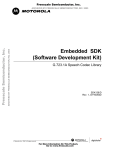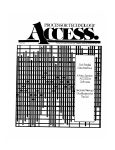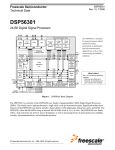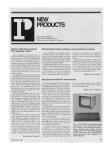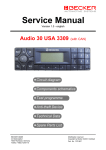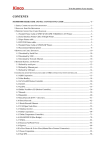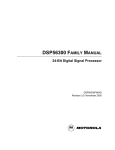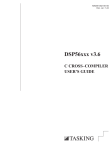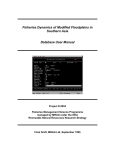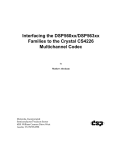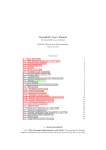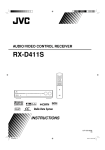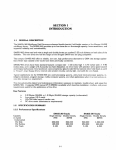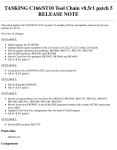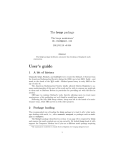Download Efficient Compilation of Bit-Exact Applications for DSP563xx
Transcript
Freescale Semiconductor
Application Note
AN1772
Rev. 2, 5/2008
Efficient Compilation of Bit-Exact
Applications for DSP563xx
Many of the standard algorithms in wireless and wireline
communications, such as GSM speech coders and the G.723.1
and G.729a coders, use 16-bit, bit-exact C code and
corresponding test vectors. These standard algorithms provided
by the ITU/ETSI organizations employ ANSI C integer data
types and implement 16-bit fractional arithmetic operations. To
specify the fractional arithmetic model, which is foreign to the
ANSI C language, the ANSI C code uses a set of subroutines
that implement basic fractional operations (for example,
addition with saturation, fractional multiplication, and
fractional multiplication-accumulate).
An algorithm complying with the ITU/ETSI style compiles on
any compiler that conforms with ANSI C. Thus, it theoretically
requires little effort to compile the algorithm for any digital
signal processor (DSP) or general-purpose processor for which
an ANSI C compiler is available. In reality, an efficient
implementation of the algorithm on a DSP requires some
modifications to the C code before the DSP C compiler can
compile it effectively.
This application note describes the process of preparing
standard 16-bit, bit-exact algorithms so that they compile for the
Freescale DSP56300 family of processors using the DSP56300
C compiler from TASKING, Inc.
© Freescale Semiconductor, Inc., 1998, 2008. All rights reserved.
CONTENTS
1
2
3
3.1
3.2
3.3
3.4
3.5
3.6
3.7
4
5
5.1
5.2
5.3
6
7
8
9
The TASKING DSP56300 C Compiler...................2
Development Flow ...................................................3
Configuring the Application Code...........................4
Prepare a makefile or an EDE Project .....................4
Configure the Code for the Target DSP Board ........5
Set Up Preliminary Compilation Switches ..............5
Verify Correctness–First Time.................................5
Include Freescale-Specific Header Files..................5
Add Freescale-Specific Source Files .......................6
Set Up the DSP Operating Modes............................6
Performing Preliminary Code Transformations.......7
Replacing Integer With Fractional Variables...........8
Define User-Defined Types for Integer and
Fractional Types.......................................................9
Identify and Redefine Inherently Fractional
Variables ..................................................................9
Verify and Correct Type Definitions .....................10
Inlining the Primitives............................................14
Using Optimized Out-of-Line Primitives ..............14
Further Optimizations ............................................15
Summary ................................................................16
The TASKING DSP56300 C Compiler
1
The TASKING DSP56300 C Compiler
The techniques described in this document require that an application be compiled with the TASKING DSP56300
C compiler. Before a standard algorithm can compile efficiently for a DSP56300 family of processors, the
TASKING compiler and tool chain must be installed. We recommend reading through the TASKING compiler and
debugger user’s manuals to become familiar with setting up a development environment under the TASKING
integrated development environment, EDE, which is available on Windows-based systems. This document
assumes familiarity with the C programming language, the TASKING compiler and debugger, and EDE.
On Windows-based systems, the first steps in preparing the C source code are: create an EDE project, import the C
source files in the project, and set up the compilation and linking switches. On UNIX-based systems, the
development process is based on makefiles, so the first step in preparing the C source code is to create a suitable
makefile for the TASKING code-generation tools.
Consult the TASKING user's manuals for information on setting up an EDE project, using the compiler, and using
options for invoking the linker. We briefly explain options cited in this document.
Table 1. Terms and Acronyms
Term/Acronym
Definition
Standard algorithm
A numeric algorithm that is part of a communications standard such as ITU/ETSI and is specified
using a C program and test vectors.
Test vectors
A set of numeric data that is fed to a program to verify its numerical conformance to the standard
algorithm.
Bit exact algorithm
A numeric algorithm for which correct functional behavior requires obtaining numerically identical
results for a predefined set of test vectors.
Integrated development
environment
A software product running on a host computer that provides interfaces to the development tools
(such as compiler, assembler, linker and debugger).
EDE
The TASKING integrated development environment.
Function prototype
An ANSI C construct that specifies the return type and the number of parameters and their types
for the given function.
ITU/ETSI primitives
A set of C subroutines, frequently used in ITU/ETSI standard algorithms, that implement fractional
computations on variables with integer types. For example, the primitive mac( ) computes the
multiply-accumulate function on three input variables, returning the accumulated result. In this
application note, the term “fractional primitives” is used interchangeably with the term “ITU/ETSI
primitives.”
ADM
Application Development Module, a development board that supports code development on
DSP56301 devices.
ALU
Arithmetic Logic Unit
ANSI
American National Standards Institute
ETSI
European Telecommunications Standards Institute
EVM
Evaluation Module, a development board that supports code development on DSP56300 family
devices
GSM
Global System for Mobile Communications
IEEE
Institute of Electrical and Electronic Engineers
ITU
International Telecommunications Union
Efficient Compilation of Bit-Exact Applications for DSP563xx, Rev. 2
2
Freescale Semiconductor
Development Flow
2
Development Flow
Setting up the application to run efficiently on a DSP56300 family processor requires these steps, which are
discussed in detail in this application note:
1. Configuring the application code
2. Performing preliminary code transformations
3. Replacing integer variables with fractional variables
4. Inlining the primitives
5. Using optimized out-of-line primitives
6. Performing further optimizations
Standard algorithms often come equipped with test vectors for verifying the correctness of the compiled
application code. The sequence of steps proposed in this document enables you to run the verification procedure at
various interim checkpoints. Performing verification at these checkpoints reduces the risk of introducing errors
while preparing the application code. The technique outlined in the sections that follow, combined with the
Freescale header files included in this document, results in code that is portable between the DSP563xx
environment and non-DSP development environments (such as a PC). The following sections detail the steps in the
process. Each step has a defined purpose, a specific goal, and a sequence of actions for attaining the goal.
Additional Reading
Working through the code optimization process requires knowledge of several DSP56300-specific topics not
explained in this application note. The following documents provide necessary information on these topics.
•
TASKING DSP56XXX C Cross-Compiler User’s Guide
•
TASKING DSP56XXX Cross Assembler User’s Guide
•
TASKING CrossView Debugger User’s Guide
•
Freescale DSP56300 Family Manual
•
Freescale DSP56300 device-specific user’s manuals
•
Harbison and Steele, C: A Reference Manual, Prentice Hall, 1995, Fourth Edition.
The topics to study in order to efficiently implement the code optimization process described in this application note
are:
•
Performing simulated Input and Output (simulated I/O) — Simulated I/O is necessary for reading test
vectors into the compiled application as it runs on a development board (EVM or ADM) as well as for
writing the results computed by the application out to a file. These operations are referred to as
“simulated” I/O because they rely on the debugger to simulate the existence of files on the DSP system
using files on the host system. Performing simulated I/O requires calling standard C library functions
from the application code and invoking debugger commands to connect files on the host system to the
data streams created by these standard C library functions.
•
Measuring performance of the application — One way to measure the performance of the application,
that is, the time the application requires to process a given amount of data, is to use the DSP563xx onchip timers. Measuring the performance of various portions of the application can help to determine
which portions require further optimization. Measurement can also help to gauge the effectiveness of the
optimizations you apply.
Efficient Compilation of Bit-Exact Applications for DSP563xx, Rev. 2
Freescale Semiconductor
3
Configuring the Application Code
3
Configuring the Application Code
Setting up a convenient software development environment for conducting subsequent steps involves setting up the
portable coding styles between the TASKING and the host compilers so that the code compiles and executes on
both environments with all test vectors processed correctly. The resulting code serves as a baseline. In subsequent
steps, as the code is transformed, this baseline is instrumental in isolating any programming errors. Steps in this
technique are as follows:
1. Prepare a makefile or an EDE project.
2. Configure the code for the target DSP board.
3. Set up preliminary compilation switches.
4. Verify correctness – first time.
5. Include Freescale-specific header files.
6. Add Freescale-specific source files.
7. Set up the DSP operating modes.
3.1 Prepare a makefile or an EDE Project
When developing DSP code on a UNIX system, use the make utility to build the executable code from the source
code. To that end, you must prepare a makefile. When developing DSP code on a Windows-based system, you can
either choose to use make or to set up the software as a project under the EDE TASKING integrated development
environment. This description of the compilation setup assumes the use of a makefile. It is straightforward to
convert this setup into an equivalent EDE project configuration. You can also instruct EDE to accept a usercustomized makefile. Typical makefile settings for the TASKING tools are:
# Select the Tasking C compiler steering program
CC=cc563
# Link the application by invoking the compiler. This is
# simpler than invoking the locator and the linker
# directly with explicit parameters.
LINK=cc563
# Choose an optimization mode out of the following list:
# Optimization disabled: -O0
# Optimization of code size: -O1
# Optimization of code size, debugging enabled: -O2
# Optimization of code speed: -O3
# Optimization of code speed, debugging enabled: -O4
OPTIMIZE = -O1
# Enable debugging using Tasking’s Crossview debugger.
DEBUG = -g
# Combine the optimization and debug options to be passed to the
# compiler. –c specifies that each source file is compiled
# and assembled separately, leaving the link phase to be
# invoked separately.
# See explanation of the –M16 switch below.
CFLAGS = -c –M16 $(OPTIMIZE) $(DEBUG)
Efficient Compilation of Bit-Exact Applications for DSP563xx, Rev. 2
4
Freescale Semiconductor
Configuring the Application Code
3.2 Configure the Code for the Target DSP Board
The TASKING compiler requires information on both the on-chip and off-chip memory available on the target
DSP board; it uses this information during the linking and locating phases. The TASKING compiler comes
equipped with definition files for the various Freescale EVM and ADM target boards. To select a target board out
of the boards the TASKING compiler supports, use the compiler’s option -Wlc -dtargetboard.dsc (where
targetboard is the name of the board). For example, the option –Wlc –d56301adm.dsc directs the compiler to
generate code suitable for executing on the DSP56301 ADM. When the software is built as an EDE project, the
target board selection is set up in the Target Hardware tab in the “EDE|Linker options …” dialogue box.
3.3 Set Up Preliminary Compilation Switches
Processors of the DSP56300 family are 24-bit devices that support an optional 16-bit arithmetic mode. Portability
of C code to these processors is greatly enhanced by running them in this mode. To set up the DSP to run in this
mode and instruct the compiler to generate code for this mode, use the –M16 switch of the TASKING compiler. This
switch is set in the makefile or in the EDE project compiler options. Details on the DSP modes and on memory size
limitations follow in Section 3.7, "Set Up the DSP Operating Modes," on page 6.
3.4 Verify Correctness–First Time
Once the preliminary compilation switches are set up, you can perform the first iteration of compiling and running
the application on the DSP hardware. Even if no DSP-specific changes are made to the code, verifying that the
application compiles and runs correctly is beneficial in uncovering any tools installation or makefile setup
problems.
3.5 Include Freescale-Specific Header Files
Code modifications performed in subsequent steps use definitions and declarations in the Freescale-specific header
files provided in the zip file provided with the application note. These definitions and declarations include, for
example, data types and macro definitions. Often, all application source files include common application-specific
header files. Typically, one of these header files defines C function prototypes for the ITU/ETSI primitives. The
recommended method for including the Freescale-specific header files is to include them in this header file using
the C preprocessor #include directive.
The original standard algorithm code usually contains one header file in which the function prototypes for the
ITU/ETSI primitives are defined, or two header files (one for the data type definitions, one for the prototypes). The
Freescale-specific header files provide a replacement for these header files. Once they are inserted into the
algorithm source code, the original function prototypes must be excluded. A convenient way to do this is to wrap
them with #if 0 and #endif C preprocessor directives.
Freescale provides the following two header files:
•
mottype.h
– defines the data types in the algorithm (e.g. Word16).
•
mathops.h
– defines function prototypes and various mappings of the ITU/ETSI primitives.
These files correspond to such files as basicop.h (in G.723.1) or typedef.h and basic_op.h (in G.729a).
For example, to exclude the original function prototypes from the basic_op.h file, the two lines
denoted by _DSP below are added to the original file.
Efficient Compilation of Bit-Exact Applications for DSP563xx, Rev. 2
Freescale Semiconductor
5
Configuring the Application Code
#if 0
Word16
Word16
Word16
Word16
Word16
Word16
…
Word16
Word16
Word16
#endif
add (Word16 var1, Word16 var2);
sub (Word16 var1, Word16 var2);
abs_s (Word16 var1);
shl (Word16 var1, Word16 var2);
shr (Word16 var1, Word16 var2);
mult (Word16 var1, Word16 var2);
norm_s (Word16 var1);
div_s (Word16 var1, Word16 var2);
norm_l (Word32 L_var1);
/*
/*
/*
/*
/*
/*
/*
_DSP */
Short add,*/
Short sub, */
Short abs, 1 */
Short shift left, 1 */
Short shift right,1
*/
Short mult, 1
*/
/*
/*
/*
/*
Short norm, 15 */
Short division, 18 */
Long norm, 30 */
_DSP */
3.6 Add Freescale-Specific Source Files
Code modifications performed in subsequent steps use subroutines provided in these source files contained in the
accompanying zip file:
•
mathops.c — provides optimized implementations of ITU/ETSI primitives that require several
instructions to compute. This file should be added to the build process.
•
motutil.c
— provides routines to profile the execution of a few specific ITU/ETSI primitives in the
algorithm. This file is for use during development only, as described later. Do not add it into the build
process yet.
3.7 Set Up the DSP Operating Modes
Efficiently executing the bit-exact standards on the DSP requires setting up the DSP to run in the following
operating modes:
•
Arithmetic saturation.
•
Twos complement arithmetic.
•
16-bit arithmetic mode (already set up in a previous step).
•
16-bit compatibility is optional. It results in more efficient code, though if the application program or
data size is large (requiring more than 32K words), the processor must run in 24-bit addressing mode.
Setting up the processor to run in these modes requires:
•
Setting up the compilation switches (in the makefile or in EDE) to use 16-bit arithmetic mode and
possibly also 24-bit addressing. When invoked with the appropriate switches, the compiler links in
start-up code that sets up these modes. To set up 16-bit arithmetic mode with 16-bit compatibility
mode, use the compiler switch –M16. To set up 16-bit arithmetic mode with 24-bit addressing, use the
compiler switch –M1624.
•
Inserting assembly instructions to set up arithmetic saturation and twos-complement arithmetic modes
on start-up.
Example:
In the following code example, the statements marked by _asm() are added to the application to set up
arithmetic saturation and twos complement arithmetic modes. The code is compiled for 16-bit
arithmetic mode, and 16-bit compatibility mode is turned on (-M16).
Efficient Compilation of Bit-Exact Applications for DSP563xx, Rev. 2
6
Freescale Semiconductor
Performing Preliminary Code Transformations
main(int argc, char *argv[])
{
Word16 DataBuff[Frame] ;
Word16 Line[26] ;
…
/* Lines below added to set up twos complement rounding and
arithmetic saturation */
_asm ("bclr #13,sr");
/* 16-compat mode off */
_asm ("opt noopnop");
/* Prevent the assembly
optimizer from removing NOPs */
_asm ("nop");
/* Pipeline delay for mode change */
_asm ("nop");
_asm ("nop");
_asm ("bset #21,sr");
/* Set Twos complement rounding on */
_asm ("bset #20,sr");
/* Set Saturation Arithmetic mode on */
_asm ("bset #13,sr");
/* 16-compat mode on */
_asm ("nop");
/* Pipeline delay for mode change */
_asm ("nop");
_asm ("nop");
_asm ("opt opnop");
/* Return assembly optimizer to normal
operation */
/* End of mode setup code */
4
Performing Preliminary Code Transformations
Architecture-independent code transformations set the baseline for optimization transformations in subsequent
steps. Preliminary code transformations replace expensive arithmetic operations with less expensive ones that are
computationally equivalent. The standard algorithms from ITU/ETSI frequently invoke primitives that are
expensive to implement on Freescale DSPs, although less expensive primitives would suffice. For example,
implementing an expensive primitive, such as a shift with a possibly negative shift amount on DSP56300
processors, is much more expensive than implementing a shift with an amount known to be positive (or known to
be negative). We recommend altering code at instances where such an expensive primitive is required and mapping
the rest of the primitive instances to the inexpensive alternative.
In some instances, static analysis of the source code reveals that a less expensive primitive would suffice. In other
instances, such a determination can be made only by profiling the algorithm while running it through the full test
vector suite. The technique described here addresses both cases.
The following process generates a list of all instances of fractional primitives in the standard algorithm that require
the more expensive primitives. The list is created by running the test vectors through the algorithm. The list is
dependent on the test vectors.
1. In mathops.h, enable the definition of the preprocessor macro MATH_CHECK by changing the line
#undef MATH_CHECK
to
#define MATH_CHECK
2. One of the original C files in the standard algorithm contains the emulation routines for the primitives.
In a previous step, the mathops.h file was included in this file (using #include "mathops.h").
Insert the following define statement before the line on which mathops.h is included:
#define SKIP_MATH_CHECK
#include "mathops.h"
Efficient Compilation of Bit-Exact Applications for DSP563xx, Rev. 2
Freescale Semiconductor
7
Replacing Integer With Fractional Variables
3. Add the source file motutil.c to the build.
This file supplies profiling routines for use in this phase only and is removed from the build before this
phase is complete.
4. Recompile the standard algorithm and run the executable through the entire set of test vectors.
As the application runs, it prints out messages to the standard output. These messages identify the
source lines where primitives are invoked that must use their expensive implementation. For example,
the following line indicates that the primitive L_shl( ), which is called from the source file lsp.c at
line 23, must be implemented with saturation checking.
lsp.c, line 23: saturation occurred in L_shl.
5. Replace these instances with a call to the corresponding primitives that provide the full arithmetic
functionality, using the conversion table shown here:
Change primitive …
to this primitive, only if it appears in the profile list
shl
_ e_shl
shr
_ e_shr
L_shl
_e_L_shl
L_shr
_e_L_shr
Note that some warnings in the profile list may refer to add() and sub() primitives. In this step the
add() and sub() primitives are not to be modified. Keep the profile list for use in a subsequent step.
6. Remove the motutil.c source file from the build.
5
Replacing Integer With Fractional Variables
Replacing integer variables with fractional variables proceeds in two phases:
•
Identify the variables in the program, which are used for computations that are inherently fractional.
•
Redefine these variables to use the TASKING C fractional data types.
Such replacement is crucial for extracting the maximal efficiency possible for compiled code on the DSP. When
replacement is complete (and the application passes the test vectors), the variables used for inherently fractional
computations are correctly redefined as fractional, and they are used in a manner consistent with their types.
Variables for computations that are inherently integer retain their definitions, and integer operators are consistently
applied to them.
Efficient code generation for the DSP requires that the fractional data types be used for the variables and
expressions that compute fractional values. The ITU/ETSI coding style usually includes user-defined types for the
variables that serve for fractional computations. Typically, these user-defined types are called Word16 and Word32,
or Word and Longword, and are mapped to short (16-bit) and long (32-bit) fractional values. This coding style is
not consistently followed. Often the standard algorithms employ these user-defined fractional types for variables
and constants that are actually integers.
The remainder of this section presents a technique for replacing integer and fractional types with user-defined
types. The steps in this technique are as follows:
1. Define user-defined types for integer and fractional types.
Efficient Compilation of Bit-Exact Applications for DSP563xx, Rev. 2
8
Freescale Semiconductor
Replacing Integer With Fractional Variables
2. Identify and redefine inherently fractional variables.
3. Verify and correct type definitions.
Some type names are frequently used in the DSP applications for either integer or fractional variables. We
recommend using the following naming conventions, as appropriate for the given initial code:
Name
Type on DSP
Type on Non-DSP Architecture
Word16
Fractional (16 bits)
Integer (16 bits)
Word32
Fractional (32 bits)
Integer (32 bits)
Word
Fractional (16 bits)
Integer (16 bits)
Longword
Fractional (32 bits)
Integer (32 bits)
Int16
Integer (16 bits)
Integer (16 bits)
Int32
Integer (32 bits)
Integer (32 bits)
The integer types are defined in the file mottype.h. You should disable (comment out) the definitions in the
algorithm’s original source code and use the definitions in mottype.h instead. Perform the following steps:
5.1 Define User-Defined Types for Integer and Fractional Types
If the application is coded using user-defined types for the inherently fractional variables, then the variables are
basically identified. Redefining the variables to use the TASKING C fractional types (that is, _fract and long
_fract) only requires remapping the user-defined types to the built-in types. For example, the following lines from
mottype.h remap the user-defined types to the built-in fractional types.
…
#define FDATA _fract
#define LFDATA long _fract
…
#define Word16 FDATA
#define Word32
/* Create an auxiliary type name FDATA …*/
/* … and a type named LFDATA */
/* Use the auxiliary type names to map
Word16 and Word32 */
LFDATA
The G.723.1 makefile maps the Word16 and Word32 user-defined types using the following C preprocessor
switches:
CFLAGS = … -DWord16=short –Dword32=long …
When these switches are removed from the makefile, the definitions from mottype.h take effect. Next, the type
definitions of variables are corrected to conform to the manner in which they are actually used. This redefining
process is based on the type inconsistency warnings that the TASKING compiler issues when variables are defined
and used inconsistently.
5.2 Identify and Redefine Inherently Fractional Variables
The first step in verifying and correcting variable type definitions is to add the compilation switch –DMATH_FRACT
to the build (makefile or EDE project setting). Next, we recompile the application. The compiler flags all uses of
variables that are inconsistent with the variables’ defined types. Based on the compiler error and warning
messages, we change the offending variable definitions. All warnings related to integer and fractional type
inconsistencies point to real errors and thus should be treated as error messages. Following are warning and error
messages that can result from integer and fractional type inconsistencies.
Efficient Compilation of Bit-Exact Applications for DSP563xx, Rev. 2
Freescale Semiconductor
9
Replacing Integer With Fractional Variables
c563 W519: <file> line <number>: conversion of integer to fractional type occurred
c563 W502: <file> line <number>: _fract constant saturation occurred
c563 E131: <file> line <number>: bad operand type(s) of ‘+’
1RWH 0DQ\FRPSLOHUHUURUPHVVDJHVDQGZDUQLQJVPD\DSSHDUZKHQWKHFRGHILUVWFRPSLOHV:H
UHFRPPHQGWKDW\RXILUVWGHDOZLWKWKHSUREOHPVIODJJHGE\HUURUPHVVDJHVDQGODWHUGHDOZLWK
WKRVHIODJJHGE\ZDUQLQJV)RUFRQYHQLHQFH\RXFDQXVHWKH±ZVZLWFKWRGLUHFWWKHFRPSLOHUWR
VXSSUHVVZDUQLQJV<RXFDQLGHQWLI\DVDPSOHRIWKHPRVWFRPPRQFDVHVRIYDULDEOHVXVHGIRU
LQKHUHQWO\LQWHJHUUROHV7KHGHILQLWLRQVIRUWKHVHYDULDEOHVFDQEHPRGLILHGWR,QWRU,QW
EHIRUHWKHFRGHLVFRPSLOHGFRQVLGHUDEO\UHGXFLQJWKHQXPEHURIFRPSLOHUHUURUPHVVDJHVDQG
ZDUQLQJV7KHPRVWFRPPRQFDVHVDUHYDULDEOHVXVHGDVORRSLQGH[HVRUDVDUUD\LQGH[HV
1RWH 7KHFRGHLVQRWFOHDQXQWLODOOHUURUPHVVDJHVDQGZDUQLQJVDUHHOLPLQDWHG7KHZDUQLQJVLQGLFDWH
SUREOHPVWKDWUHVXOWLQWKHJHQHUDWLRQRILQFRUUHFWFRGH
1RWH 7KHWUDQVIRUPDWLRQVSUHYLRXVO\GHVFULEHGQHHGQRWEHDSSOLHGWRWKHVRXUFHILOHLQZKLFKWKH
HPXODWLRQURXWLQHVIRUWKH,78(76,SULPLWLYHVDUHGHILQHGW\SLFDOO\WKLVILOHLVFDOOHG
basicop.cRUbasic_op.c
5.3 Verify and Correct Type Definitions
The following situations occur frequently in the standard algorithms. For each situation a remedy is presented:
•
Using integer constants in fractional expressions
•
Unnecessary type casts
•
Inconsistent use of the user-defined types
•
Logical operations on fractional values
•
Shift operations on fractional values
•
Using primitives for integer arithmetic
•
Using a variable as both Fractional and Integer
5.3.1 Using Integer Constants in Fractional Expressions
Some of the following cases use type casting macros defined in mathops.h:
#define
#define
#define
#define
#define
#define
_CI(X)
_CPI(X)
_CLI(X)
_CF(X)
_CPF(X)
_CLF(X)
*(INT )&(X)
(INT *)(X)
*(long int *)&(X)
*(_fract *)&(X)
(_fract *)(X)
*(long _fract *)&(X)
/*
/*
/*
/*
/*
/*
Convert
Convert
Convert
Convert
Convert
Convert
to
to
to
to
to
to
int */
pointer to int */
long */
fractional */
pointer to fract. */
long fract. */
1RWH 7KHFRPSLOHUFDQQRWGHWHFWXVHRIWKHB&,RSHUDWRURQDELWYDOXHRUXVHRIB&/,RQDELW
YDOXHVRJUHDWFDUHPXVWEHWDNHQZKHQDSSO\LQJWKHFRUUHFWFRQYHUVLRQRSHUDWRU
First, we replace casts of constants with casts to the integer user-defined types (Int16 or Int32). If the constant is
used in an assignment to a fractional variable, we wrap the variable instance using the _CI() or _CLI() macros.
These macros cast the reference to be a reference of integer type, as shown in the following example.
Word32 Acc0;
…
Acc0 = (Word32) 0x04000000;
Efficient Compilation of Bit-Exact Applications for DSP563xx, Rev. 2
10
Freescale Semiconductor
Replacing Integer With Fractional Variables
changes to:
Word32 Acc0;
…
_CLI(Acc0) = (Int32) 0x04000000;
If the assignment occurs in the variable definition, then the definition and initialization must be separated out of the
definition, as follows.
Word32 Acc0 = (Word32) 0x04000000;
changes to:
Word32 Acc0;
_CLI(Acc0) = (Int32) 0x04000000;
If the constant is used in an expression or as an actual parameter to a function, then a temporary variable must be
introduced as follows.
Word16 wf[10],temp;
wf[i] = sub(1843, mult(temp, 6242));
changes to:
Int16 tmp_1843 = 1843, tmp_6242 = 6242;
…
wf[i] = sub(_CF(tmp_1843), mult(temp, _CF(tmp_6242)));
This example uses the _CF() macro, which converts a reference into a reference to a fractional type. If the
temporary variable definitions are placed in an inner block close to their use, the TASKING compiler can usually
generate code that does not assign them memory or stack space.
5.3.2 Unnecessary Type Casts
Often the code contains casts to the user-defined types in situations that do not require an explicit cast. Replace the
unnecessary type cast with one that casts the value to the corresponding integer user-defined type, as follows.
a = shr(a, (Word16) 1);
changes to:
a = shr(a, (Int16) 1);
5.3.3 Inconsistent Uses of the User-Defined Types
Sometimes variables defined using the user-defined type are used in roles that are inherently integer. For example,
the Exp variable in the following example is inherently integer (it computes a bit offset inside a data word).
Example:
Word16 Exp, Acc0;
Exp = norm_s( Acc0 );
Acc0 = shr(Acc0, Exp);
This code is changed to:
Int16 Exp; Word16 Acc0;
Exp = norm_s( Acc0 );
Acc0 = shr(Acc0, Exp);
Other examples are loop indexes and array offsets that use variables defined with user-defined types. To correct
this situation, redefine the variable as Int16 or Int32 as appropriate.
Efficient Compilation of Bit-Exact Applications for DSP563xx, Rev. 2
Freescale Semiconductor
11
Replacing Integer With Fractional Variables
5.3.4 Logical Operations on Fractional Values
The logical operators in C (&, |, ^) cannot be applied to variables with the TASKING C types _fract or long _fract.
Occasionally, the standard algorithm requires that such operators be applied to variables that are fractional, as
shown in the following example. We change the access to the fractional variable to use the appropriate conversion
operator (_CI() for 16-bit fractional variables, _CLI() for 32-bit fractional variables).
Example:
Word16 Acc0; Word32 Lvar;
Acc0 = extract_h(Lvar);
if (Acc0 & 1) ...
if (Lvar ^ 0xc0000000) ...
changes to:
Word16 Acc0; Word32 Lvar;
Acc0 = extract_h(Lvar);
if (_CI(Acc0) & 1) ...
if (_CLI(Lvar) ^ 0xc0000000) ...
The conversion operators are defined in mathops.h. The conversion operators cannot be applied to results of
arithmetic computations (e.g. values returned by functions). In such cases, the arithmetic expression must be
computed into a temporary variable and the operator applied to the variable, as shown here.
Example:
if (extract_h(Lvar) & 1) ...
converts to:
Word16 ftmp;
ftmp = extract_h(Lvar);
if (_CI(ftmp) & 1) ...
5.3.5 Shift Operations on Fractional Values
The shift operators in C (<<, >>) cannot be applied to variables defined with the TASKING C types _fract and long
_fract. Occasionally, the standard algorithm requires that such operators be applied to variables that are fractional.
Typically, these operations are applied from the standard C program by calling the primitives (shr() and shl()). If
the original code applies the built-in C operators (<< or >>) to fractional variables, then the most convenient
technique for correcting the code is to cast the fractional variable accesses using the _CI() and _CLI() operators
(similarly to Section 5.3.4). The rest of this description addresses cases where the shift operations are specified
using the shift primitives (shl() or shr()).
If the shift is by an amount that is computed at run time (that is, the second parameter to the shl() or shr()
functions is not a literal), then we use the technique described previously for logical operations. If the shift is by an
amount that is known at run time (and that amount is larger than 0), we replace the call to the shift function (shr()
or shl()) by calls to the macros _f_shr() and _f_shl(). These macros are transformed by the compiler to
DSP56300 shift instructions. For example:
a = shr(a, (Word16) 1);
changes to:
a = _f_shr(a, (Int16) 1);
Efficient Compilation of Bit-Exact Applications for DSP563xx, Rev. 2
12
Freescale Semiconductor
Replacing Integer With Fractional Variables
5.3.6 Using Primitives for Integer Arithmetic
Occasionally fractional primitives, such as add( ) and shl( ), are used for computing integer expressions. Such
instances are characterized by the appearance of inherently integer variables, such as loop indexes and array
indexes, as parameters to the primitives or as the destination for their results. Although this is only a warning, the
compiler may generate incorrect code for the expression. We recommend that you modify the code to prevent such
warnings. The profiling in an earlier step identified instances that must use the fractional arithmetic, if such
instances exist. We replace invocation of the primitives by invocations of corresponding primitive. These
primitives are defined in mathops.h:
Change primitive …
to this primitive, unless it appears in the profile list
add
_i_add
sub
_i_sub
shl
_i_shl
shr
_i_shr
In theory, these instances may require the exact functionality of the fractional operation (that is, saturation on the
addition overflow). If the instance of the primitive appears in the profile list, the operation must retain its full
fractional arithmetic characteristics. The parameters and the return value for the invocation must be treated
according to the previous description for inconsistent use of variables. For example:
Word16 Pr;
...
Pr = sub(Pr, (Word16) 1);
...
Acc0 = Buf[Pr];
The computation of Pr changes to
Int16 Pr;
...
Pr = _i_sub(Pr, (Int16) 1);
. . .
Acc0 = Buf[Pr];
5.3.7 Using a Variable as Both Fractional and Integer
Occasionally, the application uses a variable both as fractional and as integer, although in mutually exclusive
lifetimes. For example, a variable is assigned an integer value and used as an integer value, and then later it is
assigned to a fractional value and used as such. Since the variable is defined as either a fractional or an integer, the
compiler flags all uses that are inconsistent with the definition.
Ccr = norm_l(Acc0);
Acc0 = L_shl(Acc0, Ccr);
...
Ccr = round(Acc0);
Acc0 = L_mult(Ccr, Ccr);
/* Ccr is used as an integer (offset) */
/* the same Ccr is used as a fractional */
Efficient Compilation of Bit-Exact Applications for DSP563xx, Rev. 2
Freescale Semiconductor
13
Inlining the Primitives
We could convert all uses of the conflicting type using the conversion operators, but this conversion would be
tedious. A simpler solution is to define an auxiliary variable and use it for all occurrences of the original variable
requiring the conflicting data type. The advantage of this method is that it prevents having to insert many
conversion operators. The disadvantage of this method is that we must first ensure that the uses of the original
variable with conflicting types are mutually exclusive.
For the preceding example, the two possible solutions are as follows:
/* --- Solution 1, using conversions --- */
Int16 Ccr;
...
Ccr = norm_l(Acc0);
Acc0 = L_shl(Acc0, Ccr);
...
_CF(Ccr) = round(Acc0);
Acc0 = L_mult(_CF(Ccr), _CF(Ccr));
/* --- Solution 2, using an auxiliary variable --- */
Int16 Ccr; Word16 fCcr;
...
Ccr = norm_l(Acc0);
Acc0 = L_shl(Acc0, Ccr);
...
fCcr = round(Acc0);
Acc0 = L_mult(fCcr, fCcr);
1RWH )RUPD[LPXPFRGHSHUIRUPDQFHWU\ERWKWHFKQLTXHVDQGFRPSDUHWKHUHVXOWV
This step completes only when the application code compiles without any error messages or warning messages.
When this step completes, the application uses fractional data types consistently. The fractional primitives are still
computed by subroutines. In the next step, the calls to most of these primitives are replaced by inlined primitives,
which yield much higher performance.
6
Inlining the Primitives
Inlining most of the fractional primitives significantly improves the performance and the code size of the compiled
standard algorithm. When this step is completed (and the application passes the test vectors), the primitives are
correctly inlined, and the compiler generates assembly instructions for performing most of the computationally
intensive operations. First, we set up the compilation to include the compiler switches -DMATH_FRACT and DMATH_INLINE and then we recompile the standard algorithm.
Inlining the primitives is treated as a separate phase to facilitate easier debugging. Since many code
transformations are performed when integer variables are replaced with fractional ones, verify correctness of the
transformations before inlining the primitives.
7
Using Optimized Out-of-Line Primitives
The purpose of using optimized out-of-line primitives is to map additional fractional operations not previously
inlined to efficient hand-coded assembly implementations. When this step is completed (and the application passes
the test vectors), the fractional primitives not inlined in prior steps are now implemented using efficient handcoded assembly subroutines.
Efficient Compilation of Bit-Exact Applications for DSP563xx, Rev. 2
14
Freescale Semiconductor
Further Optimizations
First, we set up the compilation to include the compiler switches -DMATH_FRACT_OPT, and then we recompile the
standard algorithm. When this compilation switch is set, some optimized primitives available in mathops.c
become part of the build. These primitives have the same names as primitives already defined (and emulated) in the
original standard algorithm code. It is now necessary to disable (comment out) the conflicting definitions in the
original standard algorithm source code. To do this, we simply identify which multiple definitions of subroutines
(primitives) the TASKING linker reports, find the source code for these subroutines in the original source code (not
in mathops.c!) and comment them out using #ifndef _DSP and #endif directives. When the code is compiled
again, the duplicate definitions are removed and the link phase thus can complete successfully.
8
Further Optimizations
At this point the application is fully converted to use the TASKING fractional data types with inlined arithmetic
operations. We can optimize the code even further using the optimization hints that are discussed in the TASKING
compiler user manual. Examples of optimizations that can be extremely beneficial when the standard algorithm is
implemented using the TASKING C compiler are:
•
Separating variables into X and Y data memory spaces. The compiler assigns all variables into one
data memory space unless the user specifically assigns variables to the non-default data memory
space. Tagging variable declarations with TASKING C data memory space specifiers (_X or _Y)
performs this assignment. Achieving maximal levels of performance on DSP56300 requires that the
user judiciously assign variables to the non-default data memory space. If the application data size
requirements are high, applying this optimization technique may be helpful in reducing the data size
requirements to the level that allows the code to run on the target development board.
•
Using pointer references instead of array references in loops. Occasionally, the compiler may miss
optimization opportunities when memory references are written using array references, and may
optimize the code better if the memory references are rewritten using equivalent pointer references.
•
Moving invariant code out of loops. Occasionally the compiler may miss opportunities to move
computations that are invariant to the loop iteration from inside the loop to its surroundings. It may be
possible to perform this optimization at the C program level and thus reduce the computational
requirements of the loop.
•
Software pipelining. Occasionally the compiler may miss opportunities to “pipeline” a loop body,
meaning to transform the structure of the loop statements into one that allows for increased
parallelism. In such cases, we can “software pipeline” the loop at the C program level, exposing the
increased parallelism for the compiler.
•
Separating uses of the same variable (having separate lifetimes) into uses of variables having different
names. This sometimes helps the compiler allocate registers to these variables more efficiently.
•
Loop unrolling. Occasionally, performance is improved when loops that iterate for a small and
predefined number of times are unrolled (that is, the body of the loop is replicated). Because code size
typically increases when this optimization technique is used, this technique should be used judiciously.
Efficient Compilation of Bit-Exact Applications for DSP563xx, Rev. 2
Freescale Semiconductor
15
Summary
9
Summary
The technique described in this application note has been successfully applied to the standard C implementation of
the G.723.1 and G.729a codecs. The transformation of the entire C implementation based on the steps detailed in
this application note require no more than several hours for one programmer. The performance of the application
depends on the additional time that is spent on further applying the additional optimization techniques briefly
described.
Following is the original code of one routine from a standard C application:
PWDEF Comp_Pw( Word16 *Dpnt, Word16 Start, Word16 Olp )
{
int
i,j
;
Word32
Lcr[15] ;
Word16
Scr[15] ;
PWDEF
Pw ;
Word32
Word16
Word16
Word16
Acc0,Acc1
Exp
;
Ccr,Enr ;
Mcr,Mnr ;
;
Lcr[0] = (Word32) 0 ;
for ( i = 0 ; i < SubFrLen ; i ++ )
Lcr[0] = L_mac( Lcr[0], Dpnt[Start+i], Dpnt[Start+i] ) ;
…
Acc1 = (Word32) 0 ;
for ( i = 0 ; i < 15 ; i ++ ) {
Acc0 = Lcr[i] ;
Acc0 = L_abs( Acc0 ) ;
if ( Acc0 > Acc1 )
Acc1 = Acc0 ;
}
Exp = norm_l( Acc1 ) ;
for ( i = 0 ; i < 15 ; i ++ ) {
Acc0 = L_shl( Lcr[i], Exp ) ;
Scr[i] = round( Acc0 ) ;
}
Pw.Indx = (Word16) -1 ;
Pw.Gain = (Word16) 0 ;
Mcr = (Word16) 1 ;
Mnr = (Word16) 0x7fff ;
for ( i = 0 ; i <= 2*PwRange ; i ++ ) {
Enr = Scr[2*i+1] ;
Ccr = Scr[2*i+2] ;
if ( Ccr <= (Word16) 0 )
continue ;
Exp = mult_r( Ccr, Ccr ) ;
Acc0 = L_mult( Exp, Mnr ) ;
Acc0 = L_msu ( Acc0, Enr, Mcr ) ;
if ( Acc0 > (Word32) 0 ) {
Mcr = Exp ;
Mnr = Enr ;
Pw.Indx = (Word16)i ;
}
Efficient Compilation of Bit-Exact Applications for DSP563xx, Rev. 2
16
Freescale Semiconductor
Summary
}
…
Acc0 = L_mult( Scr[0], Mnr ) ;
Acc1 = Acc0 ;
Acc0 = L_shr( Acc0, (Word16) 2 ) ;
Acc1 = L_shr( Acc1, (Word16) 3 ) ;
Acc0 = L_add( Acc0, Acc1 ) ;
Acc1 = L_mult( Scr[2*Pw.Indx+2], Scr[2*Pw.Indx+2] ) ;
Acc0 = L_sub( Acc0, Acc1 ) ;
…
Pw.Indx = Olp - PwRange + Pw.Indx ;
return Pw ;
}
Following is the code of the same routine after application of the steps described in this application note and before
the application of the additional optimizations. Modifications to the code are emphasized in bold italics.
PWDEF Comp_Pw( Word16 *Dpnt, Int16 Start, Int16 Olp )
{
int
i,j
;
Word32
Lcr[15] ;
Word16
Scr[15] ;
PWDEF
Pw ;
Word32
Int16
Word16
Word16
Acc0,Acc1
Exp
;
Ccr,Enr ;
Mcr,Mnr ;
;
Lcr[0] = (Word32) 0 ;
for ( i = 0 ; i < SubFrLen ; i ++ )
Lcr[0] = L_mac( Lcr[0], Dpnt[Start+i], Dpnt[Start+i]) ;
…
Acc1 = (Word32) 0 ;
for ( i = 0 ; i < 15 ; i ++ ) {
Acc0 = Lcr[i] ;
Acc0 = L_abs( Acc0 ) ;
if ( Acc0 > Acc1 )
Acc1 = Acc0 ;
}
Exp = norm_l( Acc1 ) ;
for ( i = 0 ; i < 15 ; i ++ ) {
Acc0 = _e_L_shl( Lcr[i], Exp ) ;
Scr[i] = round( Acc0 ) ;
}
Pw.Indx = (Int16) -1 ;
Pw.Gain = (Int16) 0 ;
_CI(Mcr) = (Int16) 1 ;
_CI(Mnr) = (Int16) 0x7fff ;
for ( i = 0 ; i <= 2*PwRange ; i ++ ) {
Word16 F_Exp;
Enr = Scr[2*i+1] ;
Ccr = Scr[2*i+2] ;
if ( Ccr <= (Word16) 0 )
continue ;
F_Exp = mult_r( Ccr, Ccr ) ;
Efficient Compilation of Bit-Exact Applications for DSP563xx, Rev. 2
Freescale Semiconductor
17
Summary
Acc0 = L_mult( F_Exp, Mnr ) ;
Acc0 = L_msu ( Acc0, Enr, Mcr ) ;
if ( Acc0 > (Word32) 0 ) {
Mcr = F_Exp ;
Mnr = Enr ;
Pw.Indx = (Int16)i ;
}
}
…
Acc0 = L_mult( Scr[0], Mnr ) ;
Acc1 = Acc0 ;
Acc0 = L_shr( Acc0, (Int16) 2 ) ;
Acc1 = L_shr( Acc1, (Int16) 3 ) ;
Acc0 = L_add( Acc0, Acc1 ) ;
Acc1 = L_mult( Scr[2*Pw.Indx+2], Scr[2*Pw.Indx+2] ) ;
Acc0 = L_sub( Acc0, Acc1 ) ;
…
Pw.Indx = Olp - PwRange + Pw.Indx ;
return Pw ;
}
Efficient Compilation of Bit-Exact Applications for DSP563xx, Rev. 2
18
Freescale Semiconductor
Summary
Efficient Compilation of Bit-Exact Applications for DSP563xx, Rev. 2
Freescale Semiconductor
19
How to Reach Us:
Home Page:
www.freescale.com
Web Support:
http://www.freescale.com/support
USA/Europe or Locations Not Listed:
Freescale Semiconductor, Inc.
Technical Information Center, EL516
2100 East Elliot Road
Tempe, Arizona 85284
+1-800-521-6274 or
+1-480-768-2130
www.freescale.com/support
Europe, Middle East, and Africa:
Freescale Halbleiter Deutschland GmbH
Technical Information Center
Schatzbogen 7
81829 Muenchen, Germany
+44 1296 380 456 (English)
+46 8 52200080 (English)
+49 89 92103 559 (German)
+33 1 69 35 48 48 (French)
www.freescale.com/support
Japan:
Freescale Semiconductor Japan Ltd.
Headquarters
ARCO Tower 15F
1-8-1, Shimo-Meguro, Meguro-ku
Tokyo 153-0064
Japan
0120 191014 or
+81 3 5437 9125
[email protected]
Asia/Pacific:
Freescale Semiconductor China Ltd.
Exchange Building 23F
No. 118 Jianguo Road
Chaoyang District
Beijing 100022
China
+86 010 5879 8000
[email protected]
For Literature Requests Only:
Freescale Semiconductor
Literature Distribution Center
P.O. Box 5405
Denver, Colorado 80217
+1-800 441-2447 or
+1-303-675-2140
Fax: +1-303-675-2150
LDCForFreescaleSemiconductor
@hibbertgroup.com
Document Order No.: AN1772
Rev. 2
5/2008
Information in this document is provided solely to enable system and software implementers to
use Freescale Semiconductor products. There are no express or implied copyright licenses
granted hereunder to design or fabricate any integrated circuits or integrated circuits based on
the information in this document.
Freescale Semiconductor reserves the right to make changes without further notice to any
products herein. Freescale Semiconductor makes no warranty, representation or guarantee
regarding the suitability of its products for any particular purpose, nor does Freescale
Semiconductor assume any liability arising out of the application or use of any product or
circuit, and specifically disclaims any and all liability, including without limitation consequential
or incidental damages. “Typical” parameters which may be provided in Freescale
Semiconductor data sheets and/or specifications can and do vary in different applications and
actual performance may vary over time. All operating parameters, including “Typicals” must be
validated for each customer application by customer’s technical experts. Freescale
Semiconductor does not convey any license under its patent rights nor the rights of others.
Freescale Semiconductor products are not designed, intended, or authorized for use as
components in systems intended for surgical implant into the body, or other applications
intended to support or sustain life, or for any other application in which the failure of the
Freescale Semiconductor product could create a situation where personal injury or death may
occur. Should Buyer purchase or use Freescale Semiconductor products for any such
unintended or unauthorized application, Buyer shall indemnify and hold Freescale
Semiconductor and its officers, employees, subsidiaries, affiliates, and distributors harmless
against all claims, costs, damages, and expenses, and reasonable attorney fees arising out of,
directly or indirectly, any claim of personal injury or death associated with such unintended or
unauthorized use, even if such claim alleges that Freescale Semiconductor was negligent
regarding the design or manufacture of the part.
Freescale™ and the Freescale logo are trademarks of Freescale Semiconductor, Inc. All other
product or service names are the property of their respective owners.
© Freescale Semiconductor, Inc. 1998, 2008.




















